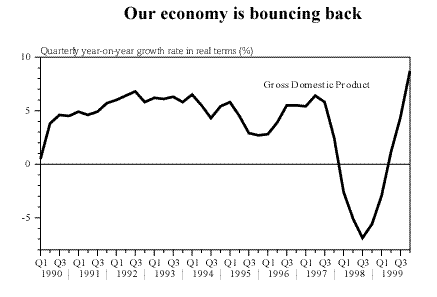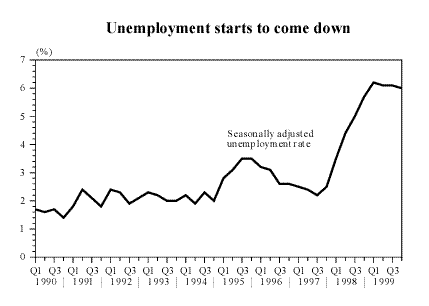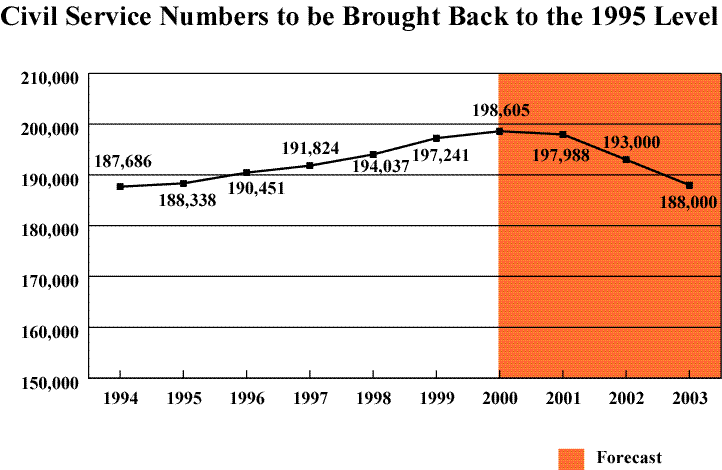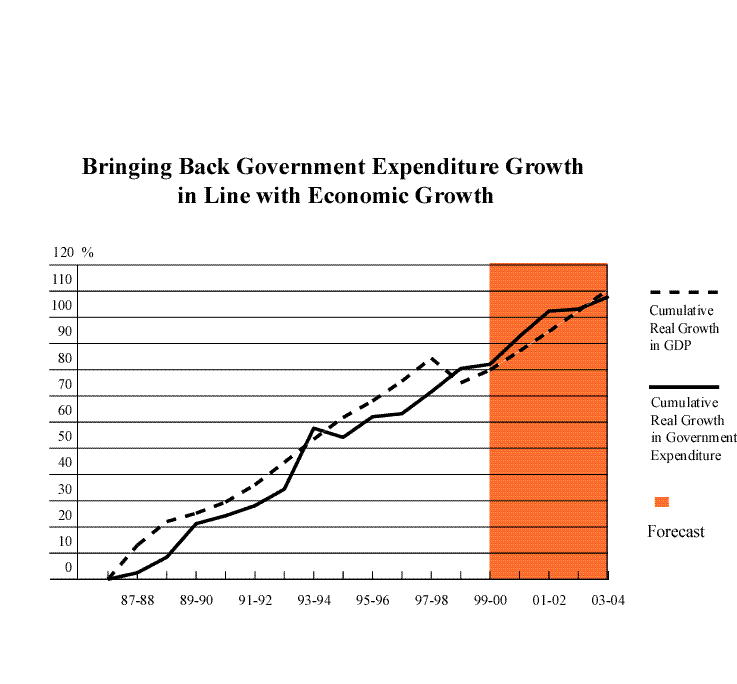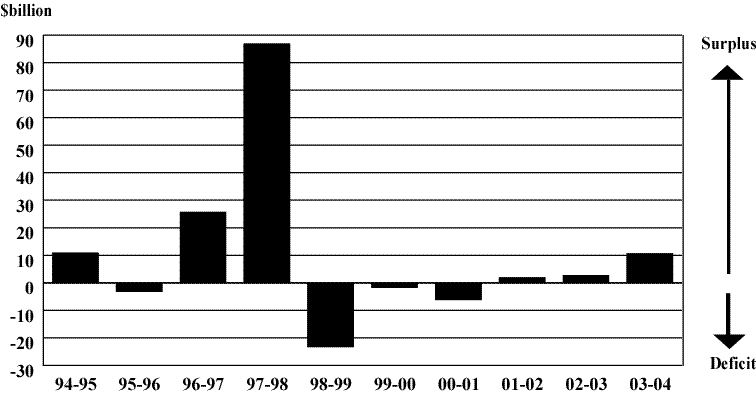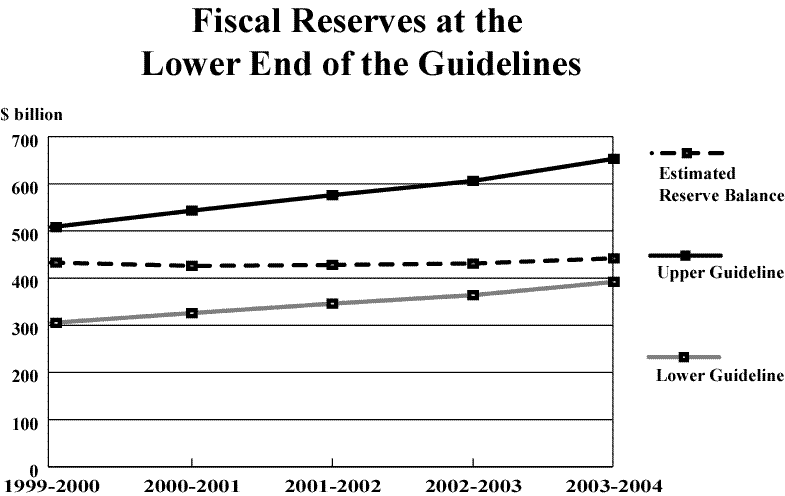| Review of Public
Finances |
| 196. Finally,
I need to address the important question of our future public financial position,
particularly the recurrent portion which represents the most significant part of our
fiscal system. |
| 197. From
the figures published this afternoon, members of the public and this Council will see that
we will have an operating deficit in 2000-01. Broadly speaking, this means our recurrent
expenditure is estimated to exceed our recurrent revenue. This repeats our experience in
1998-99 and 1999-2000 and is forecast to continue up to 2002-03. This has not happened in
the 50 years before 1998. If it persists, we will have a serious fiscal problem. |
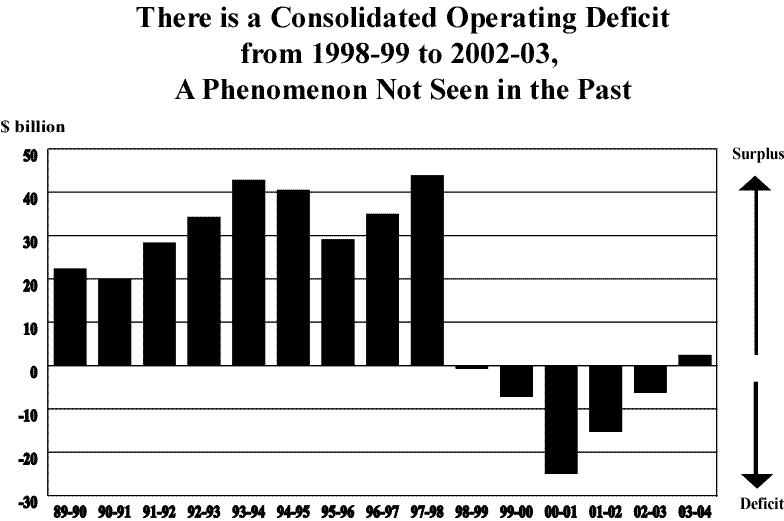
|
| 198.
For the moment, we do not know whether the phenomenon of
successive operating deficits is simply cyclical in nature, or whether it represents a
more serious structural problem. We will know the answer only when we can see the extent
to which our revenue picks up as the economy gathers momentum. This will take some time.
But as a responsible Government, we simply cannot afford to scramble for solutions only
when all the signs are there that Hong Kong does actually face a structural financial
problem. To safeguard the long-term interests of the community, we need to take active
steps now to make sure that we have ready some well-deliberated and feasible measures to
keep Hong Kong safe from fiscal instability even under the worst case scenario and to
maintain investors' confidence in our economy. |
| 199.
We also need to be alert to potential problems that may
erode our revenue base. These include our very narrow and shrinking profits and salaries
tax nets; the possible loss of profits tax due to globalisation; a decrease in revenue
because of our inability to revise fees and charges for public services; threats to our
betting duty yield from illegal gambling and the spread of e-gambling; and the erosive
impact of global competition on our yields from stamp duty on stock transactions. |
| 200.
Our improved land supply mechanism has already brought a
more abundant and steady supply of land to the market. As a result, we can expect that
income from land transactions will be less volatile and unlikely to produce the kind of
windfalls which we have seen in the past. The same applies to other types of land- and
property-related revenue such as stamp duty on property transactions, and possibly even
profits tax collections from the property and banking sectors. |
| 201.
I sincerely hope that our package of measures to encourage
the transport industry to switch from diesel to LPG for environmental reasons proves
successful. But if it does, one effect will be a gradual drop in our income from diesel
duty from as early as next year. |
| 202.
The greatest uncertainty stems from the likely exponential
growth of e-commerce and its impact on our tax regime. As more commercial activities take
place on the Web, we can expect greater complications and difficulties in tax assessment
and collection. This is a subject now being studied by many governments and international
organizations. Hong Kong's territorial-based tax system, under which we tax only
locally-derived income, is likely to make our revenue yield even more vulnerable to the
impact of e-commerce. |
| 203.
If government revenue became unsustainable because of these
factors, we could deal with the problem in three ways. The first is to exercise strict
control over government expenditure. Indeed this is already what we are doing. My decision
to reduce the growth rate of recurrent expenditure to 2.5 per cent for 2000-01, plus our
EPP efforts and the measures to control Civil Service numbers outlined today, are solid
proof that we are determined to achieve this aim. But there is an emerging school of
thought that cutting down on government spending will cure all fiscal ills, as if this
Government has been engaging in profligate spending. Nothing is further from the truth.
The vast bulk of our expenditure is spent on the direct provision of public services such
as housing, education, medical services, law and order and social welfare. Drastic cuts in
expenditure in these areas would inevitably affect the level and quality of services to
the public, and the ones to suffer most would be those in the low-income bracket. Such an
outcome is not acceptable to the Government and I am sure it is unpalatable to Members and
the entire community, not to mention that it would also undermine Hong Kong's long-term
interests. |
| 204.
The second option is to do nothing about the structural
deficits but to dip into our reserves every time expenditure outstrips income, until the
time comes when our reserves are depleted and we have to find another way out. Such
reckless behaviour would clearly be against the Basic Law requirement to strive for fiscal
balance. It would also mean that, as our reserves run down, we would no longer have
adequate means to defend our currency, provide relief to our citizens or maintain our
spending programmes in an economic downturn. I cannot believe this is what Hong Kong
people want. And investors would quit Hong Kong in droves. |
| 205.
The only remaining option is to increase revenue to make
sure that the Government will have enough income to pay its bills. This could be achieved
through widening our tax net and tax base, raising existing tax rates, or introducing new
taxes. We know very well that any of these could have an impact on our economy and the
livelihood of our citizens. Indeed, that is one reason why I have not tinkered with any
major tax item this year. But a possible loss in revenue due to changing global and
domestic circumstances could be a problem. We would be failing in our duty if we hid our
heads in the sand and hoped that the problem would never arise or somehow disappear. This
is especially true if we want to make sure that Hong Kong remains fiscally sound in the
years to come and that the Government will continue to have the means to maintain and
improve public services and enhance Hong Kong's competitiveness. |
| 206.
I have decided to take a two-pronged approach that would
enable us to study the extent and nature of the problem as well as find the solutions. The
Secretary for the Treasury will head a Task Force which will continue to monitor the
correlation between our recurrent income and economic growth. This should enable us to
identify whether we are indeed facing a short-term cyclical problem or a fundamental shift
in our revenue base needing more radical remedies. In addition, the Task Force will
critically examine the viability of our existing tax regime. In this process, it will
elicit the views of Members and experts in the field. |
| 207.
In parallel, we will set up an independent committee
comprising tax experts, professionals and academics. This committee will be tasked
specifically to look into the suitability of introducing new types of broad-based taxes,
including a consumption-based tax, and to consider what form such taxes should take and
their practical implications. The job of the committee will be to weigh the relative pros
and cons of the different options, and recommend to me as soon as possible the most
feasible and desirable ones. The committee will publish its report. |
| 208.
In this context, I wish to make one point clear:
maintaining our low, simple and predictable tax regime is an important building block of
our prosperity. This is also in line with Article 108 of the Basic Law. Under no
circumstances will I depart from this important principle and sacrifice Hong Kong's
competitiveness. |
